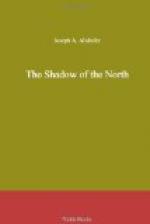Robert now had much experience of Indian attack and forest warfare, but it always made a tremendous impression upon his vivid and uncommon imagination. The great pulses in his throat and temples leaped, and his ear became so keen that he seemed to himself to hear the fall of the leaf in the forest. It was this acute sharpening of the senses, the painting of pictures before him, that gave him the gift of golden speech that the Indians had first noticed in him. He saw and heard much that others could neither hear nor see, and the words to describe it were always ready to pour forth.
Willet and Tayoga were crouched near him, their rifles thrust forward a little, and just beyond them was Captain Colden who had drawn a small sword, more as an evidence of command than as a weapon. The men, city bred, were silent, but the faces of some of them still expressed amazement and incredulity. Robert’s quick and powerful imagination instantly projected itself into their minds, and he saw as they saw. To them the cry of a wolf was the cry of a real wolf, the forest was dark, lonely and uncomfortable, but it was empty of any foe, and the four who had come to them were merely trying to create a sense of their own importance. They began to move restlessly, and it required Captain Colden’s whispered but sharp command to still them again.
The cry of the wolf, used much by both the Indians and the borderers as a signal, came now from the east, and after the lapse of a minute it was repeated from the west. Call and answer were a relief to Robert, whose faculties were attuned to such a high degree that any relief to the strain, though it brought the certainty of attack, was welcome.
“You’re sure those cries were made by our enemies?” said young Colden.
“Beyond a doubt,” replied Willet. “I can tell the difference between the note and that of a genuine wolf, but then I’ve spent many years in the wilderness, and I had to learn these things in order to live. They’ll send forward scouts, and they’ll expect to find you and your men around the fire, most of you asleep. When they miss you there they’ll try to locate you, and they’ll soon trail us to these bushes.”
Captain James Colden had his share of pride, and much faith in himself, but he had nobility of soul, too.
“I believe you implicitly, Mr. Willet,” he said. “If it had not been for you and your friends the enemy would have been upon us when we expected him not at all, and ’tis most likely that all of us would have been killed and scalped. So, I thank you now, lest I fall in the battle, and it be too late then to express my gratitude.”
It was a little bit formal, and a little bit youthful, but Willet accepted the words in the fine spirit in which they were uttered.
“What we did was no more than we should have done,” he replied, “and you’ll pay us back. In such times as these everybody ought to help everybody else. Caution your soldiers, captain, won’t you, not to make any noise at all. The wolf will howl no more, and I fancy their scouts are now within two or three hundred yards of the fire. I’m glad it’s turned darker.”




